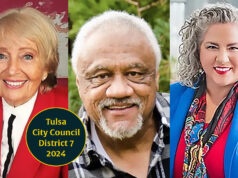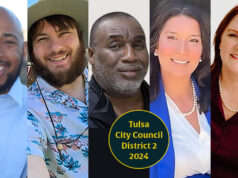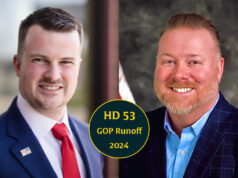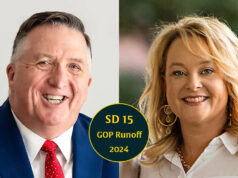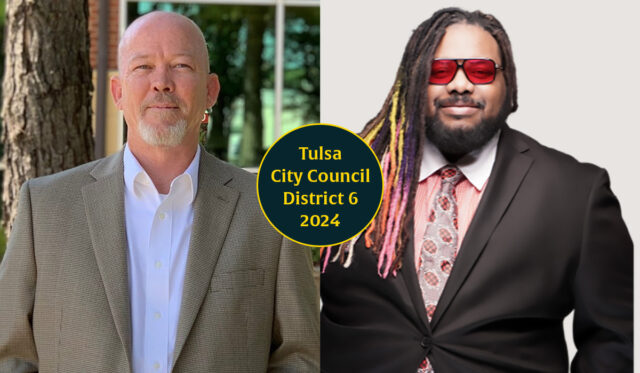

A two-year feud between Tulsa District 6 City Councilman Christian Bengel and his predecessor has seeped into his current campaign against challenger Uriah Davis.
While both candidates outlined their views for the future of District 6 during discussions about the campaign, Bengel also defended himself from allegations raised by his predecessor that he says are designed to “make me out to be a corrupt piece of shit.” Connie Dodson, who represented District 6 from 2014 to 2022, is not running for office this year, but she accused Bengel last month of supporting a rezoning application to benefit one of his 2022 campaign donors.
With proposals from municipal code enforcement to recruiting multinational corporations, both candidates see economic development as one of the top issues facing the east Tulsa district.
Bengel also expressed support for the city’s current stance in lawsuits challenging Tulsa municipal court’s jurisdiction over tribal citizens and questioned whether tribal citizens should be allowed to work for the Tulsa Police Department. Davis said he supports tribes prosecuting tribal citizens.
Bengel, 56, grew up in a “pretty poor background” and lived across most of the Midwest. He enlisted in the U.S. Army in 1985 and settled in east Tulsa after completing his service commitment in 1994. He said he spent his early days in town working low-paying jobs until landing a temporary job working for the city. He briefly worked at WorldCom before landing his current job at Lumen Technologies (formerly Level 3) in 2011.
He first ran for the Tulsa City Council in 2020 and lost before winning his second campaign in 2022. He is endorsed by U.S. Rep. Kevin hern (R-OK1) and Lt. Gov. Matt Pinnell, as well as by Mayor G. T. Bynum and the Tulsa World.
Davis, 35, is from Tulsa and one of the master of ceremonies for Tokyo in Tulsa, an anime convention. He has both a bachelor’s and a master’s degree from Oklahoma State University and spent time living in Japan, South Korea, Finland, Norway, Sweden, Estonia, Germany, Poland and Denmark. Davis is endorsed by Run for Something, a Democratic national group that supports “young, diverse progressives” running for office.
While city elections are nonpartisan, Bengel is openly running as the “conservative” candidate, and Davis is equally open about being the “Democratic” candidate. The election is scheduled for Tuesday, Aug. 27, with early voting beginning Thursday, Aug. 22, at the Tulsa County Election Board.
Tulsa City Council District 6 candidates talk development
Bengel said code enforcement and public safety are the top two issues he has received emails about from constituents. On public safety, he outlined his efforts to crack down on “unlawful gunfire” in the district, which he said “his predecessor” had misframed as “celebratory” gunfire.
“[Unlawful gunfire] was misframed as celebratory gunfire, which kind of made it seem like it was all being done by our immigrant population,” Bengel said. “The problem is unless you can see who is actually firing a gun you can’t attribute it to a specific populace. It could just as easily be someone who’s lived here their entire life and shouldn’t have a gun because any responsible gun owner wouldn’t behave that way.”
On code enforcement, Bengel said he focuses on educating citizens who do not realize they’re violating municipal laws.
“When folks come from different countries, there are things that are acceptable in their cultures,” Bengel said. “Some of them are parking on the lawn or starting a business out of their homes, not mowing their lawns and things of that nature. The problem with that is most of them — when you speak to them — don’t know these things because when they came here they don’t come here with a booklet that says, ‘OK, these are the rules of living in a neighborhood.'”
Davis said his top priority for the district would “creating community” through establishing new festivals and building a community center in the district
“There is a want and a presence to want to do intercultural things, so I want to address that through festivals, cultural events, exchanges and things of that nature. But to do that, we have to do some investment over here,” Davis said. “In particular, creating third spaces. We don’t have a community center in the district at all, and we kind of need that.”
Davis also cited creating a municipal identification card for immigrants in Tulsa who lack another form of identification.
“One of those (ways to help immigrant communities) is by creating a municipal ID for them,” Davis said. “If TPD had a situation, they have an ID instead of trying to scramble for all these documents that maybe TPD doesn’t understand. They’re not trained in dealing with international licensing as a whole.”
Bengel said his focus on public safety and code enforcement is meant to make District 6 naturally more attractive for economic development.
“If you have a safe and aesthetic portion of the city, that makes it easier for you to ask others to invest in your district,” Bengel said. “The first two are really the citizens’ portion. If the citizens are doing the first two parts (…) it makes it easier for you to ask others to come to your district and start investing.”
Davis’ vision for economic development involves courting more international development for the district.
“At one point, Tulsa was known as a very internationally recognized location, hence the international airport that’s no longer international.” Davis said. “I want to keep diving for new international partners because it is shown that international partners last longer than a regional or a national partner. They’re more likely to say, ‘We put our roots here and we’re here.'”
Davis: Bengel’s comments ‘ostracize’ renters
Bengel criticized his opponent as mostly interested in representing a “global district” and “ribbon cutting,” while also saying he believes city councilors should own property to be “invested” in their district.
“You can’t have someone who’s not invested in the district,” Bengel said. “My opponent doesn’t own property. He’s lived in the district four years, yet somehow, he now wants to run the district. He’s not served on any authorities, boards or commissions. That would have been the proper way to do this if you only lived in the district for four years.”
Asked about Bengel’s comments on his status as a renter, Davis said he does not believe property ownership is relevant to the election.
“What’s best for Tulsa should not depend on whether you own or not. There is an historical disadvantage for people that are not of a certain color or attribute, and I don’t like bringing race into it, but there are disadvantages in Tulsa for people that’s coming into it,” Davis said. “I’m more closely aligned with the citizens who are here because there is a lot of renters here, just as much as there is homeowners in District 6.”
Davis also said he was “unfazed” by Bengel’s criticism.
“Oh, you own a home? You’re also twice my age. We live in two different worlds. You got your money, I’m still trying to get mine,” Davis said. “The next generation also doesn’t own homes, and you’re going to ostracize them for the same thing.”
Candidates differ on lawsuits with tribes
Since the 2020 McGirt v. Oklahoma decision functionally upheld the eastern half of Oklahoma as a series of Indian reservations, Tulsa is the largest city in the United States to fall almost entirely within Indian Country. The current mayoral administration is engaged in at least two separate lawsuits over Tulsa’s decision to continue exercising criminal jurisdiction over tribal citizens in municipal court.
Bengel expressed support for the Bynum administration’s position and Gov. Kevin Stitt’s stance on the McGirt decision. He argued that tribal governments lacked the capacity to handle criminal cases involving tribal citizens.
“I think the McGirt decision has been detrimental to our relationship between the city and the tribes. In my opinion, it’s been a challenge for our criminal courts. If you live within the boundaries of the state of Oklahoma that was established in 1907, we’re equal citizens under state law,” Bengel said. “I don’t think they’re structured to handle everything that is associated with their tribal members.”
Bengel also said he believes tribal citizens, over whom the city would not have jurisdiction to adjudicate crimes, should not be allowed to serve as officers in the Tulsa Police Department.
“I also believe that if you aren’t subject to laws, you can’t be a police officer in the City of Tulsa if you’re a native. You can’t enforce laws you’re not subject to,” Bengel said. “I just hope the courts will get it figured out so that it creates less of a contentious relationship between the tribes and the city, because I think both want to do what’s best for their citizens.”
Davis expressed the opposite view on the city’s continued prosecution of tribal citizens.
“I believe that if it’s tribal citizens, let the tribes do it,” Davis said. “I don’t think it’s going to hurt us if we’re already in cooperation on multiple aspects of governance.”
Bengel trades corruption allegations with predecessor
Connie Dodson represented District 6 before she losing her 2022 reelection campaign to Bengel by 168 votes. While she is not running for office this year, Dodson came to a July City Council meeting to accuse Bengel of supporting a rezoning application to benefit one of his 2022 campaign donors.

The application was recommended for denial by the Tulsa Planning Commission owing to a precedent of denials set in the 1990s. The city’s master plan has the 20-acre plot designated for neighborhoods, but the application requested that it be rezoned for light industrial use. The City Council approved the rezoning.
The land appears to be owned by a now-defunct Kansas company that was owned by a member of the Crossland family, one of Bengel’s largest campaign donors during his 2022 campaign and the owners of Crossland Construction.
Dodson accused the Crossland family of having “bought the seat” in District 6 to “get a friendly voice at the table” to push through their rezoning application.
“Which, in my opinion, is one of the worst cases of political corruption I’ve seen on the City Council ever,” Dodson said.
Dodson also provided a copy of a video from 2022 where Bengel appears to be celebrating his election night victory. In the video, he thanks his “strategist,” Teresa Crossland, for her help with the campaign.
Asked about his or his campaign’s relationship with the Crossland family, Bengel chuckled and said, “I know where this is going.”
He then declined to answer the question.
“That’s not relevant. It’s none of nobody’s business — not even yours,” Bengel said. “My campaign donations are very transparent — they’re out there on my website, they’re out there posted on the city’s website. Let me tell you, that specific development is the reason why I was approached for this support.”
After a short pause, Bengel continued.
“In 2022, Nov. 7, Channel 6 ran the same damn story,” Bengel said. “Ran it again, but never came and contacted me and said, ‘Hey, we’re running this story.’ The first two things that came out of my mouth when we walked into the room and sat down with these folks, the very first two things, was, ‘This is not a quid pro quo‘ and ‘I appreciate your support.'”
Bengel said he approached the Crossland’s proposal from a “sterile” and “objective” point of view and met with other stakeholders in the district.
“The problem was the city councilor before me (Dodson) was the corrupt one because what they were doing was they were denying a property owner access to government simply because they were controlled by a neighborhood a half mile down the road,” Bengel said. “So, what happened is I — and this is factual — I spoke to the community and told them, ‘I am supporting this application and here’s the reason why.’ The reason why was this property was 20 acres and the adjoining property was already zoned the same thing, [light industrial].”
He said there is still “green space” between the new industrial zone and all nearby preexisting housing.
“It was the Tower Heights neighborhood that was opposed to it — the leadership of the neighborhood association,” Bengel said. “So instead, what they decided to do was they decided to activate my predecessor to come down here and make me out to be a corrupt piece of shit.”








